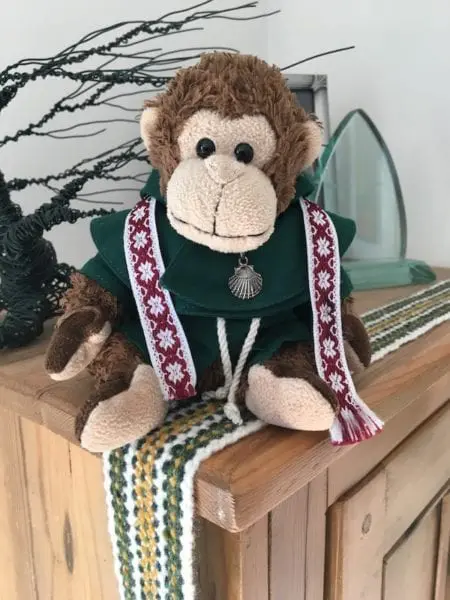Dearest monks, artists, and pilgrims,
This week we are featuring one of our Hildy Tails. This series of essays were composed last year for our Sustainers Circle. They were dictated to John by the Abbey’s mascot, Hildy the Monk-ey. Hildy is a bit of a free spirit who likes to entertain and doesn’t normally feel constrained by conventional story structure . . . or grammar, in general. She lives by the motto that “all stories are true; some actually happened.” We wanted to share them with you, our wider Abbey community, to give you a small monkey-sized, humorous perspective on some biblical passages and stories of the saints.
The Wise Guys (Matthew 2:1-12)
Hello and welcome back! It’s Hildy, your Abbey of the Arts mascot, with another instalment of weird and wild stories from the Bible. Today’s story has an added weirdness factor in that I’ll be discussing the magi well after the Feast of Epiphany. (Originally, this was to go out before the feast day. But then we realised that we kinda front loaded the month with a lot of content, so have spread things out a bit. But I wasn’t about to not talk about these folks with the gifts. Who doesn’t love gifts, am I right? Besides, the magi arrived late to the birth, so it’s seems appropriate to talk about them a bit late, too.)
The story even begins oddly. A bunch of foreign dignitaries show up at King Herod’s palace and ask to see (essentially) the king’s replacement. (It’d be like if someone new showed up and work and said that you’re supposed to train them in your job. A heck of a way to find out you’re getting fired, is it not?)
Now after checking with his advisers (aka – the people who actually know stuff), Herod gives the magi instructions to go find the new king and then come back and tell him exactly where the kid is . . . so he can go pay tribute to the new king, too (wink, wink). At this point, I wouldn’t be surprised if the magi didn’t need an angel whispering in their dreams to tell them that this Herod guy was up to no good, what with not knowing about the new king and then not knowing where to find the child AND asking them to tell him where to his replacement is.
Needless to say, the “wise men*” go home by a route that totally avoids having to deal with King Herod. A smart move on several levels.
Now some of you may have noticed the quotation marks and asterisk in the previous paragraph. And some of the more observant of ye may have even noticed that I have specifically avoided the use of the number 3 in reference to the magi. That’s because we’re not sure, according to the text, how many magi there were OR if they were all men.
We tend to assume there’s three of them because that’s the number of gifts they brought (more on that later) and because of later musical and literary additions to the story of the magi. There’s nothing in the text to indicate they were kings (or royalty, necessarily). But still, we all know that Christmas carol (it’s a cracker, for sure). But that’s not Gospel . . . literally.
“But wait,” some of you are saying, “don’t we know their names?”
Yes and no. Yes, there’s the legend of their names: Melchoir, Caspar, & Balthazar (spellings may vary, depending on your region and language of origin). No, these great (like, if I ever had triplets . . . great) names are not mentioned in the Bible. They come from poems and songs and legends written well after the fact. And speaking of legends, there’s the one about how part of Jesus’ missing years (between thirteen and thirty), he travels east to reconnect with the magi and learn from them. Great story; not Biblical. So rather than get sucked into that rabbit hole of Midrash gold, let’s just get back to what’s in the original story . . . as it’s weird enough as it is.
Speaking of weird, what’s with those gifts? Why not, as one recent satirical site wondered, a stuffed camel and wooden rattle for the baby . . . and perhaps a nice skin of wine for the new parents? Who brings a new-born gold, frankincense, and myrrh?!?
OK. Gold, I get. It’s like the ancient world’s version of a gift card . . . only shinier and way better.
But frankincense? I suppose a nice incense wouldn’t go amiss around an infant, what with the stinky diapers and all. But still . . . this is fancy incense, like something you’d use in a special ceremony. Which was the point, I guess. The magi just weren’t there to gawk at any auld baby. They came to pay their respect and homage to a very special child, the Son of God. (It’s still weird, right? Particularly for a baby?)
And what about myrrh? I mean how many people today even know what myrrh is? I certainly had to look it up. Even John had to double-check and you better believe we’re asking Christine to triple-check this one. I mean . . . myrrh? Myrrh?!? For a baby!?!
It’s an embalming oil.
Way to bring down the joyous mood of a first-born child. #Creepy . . . am I right?
Alright, it can also be used as an anointing oil . . . and not just at death. But that’s what it was used for back then. And that’s clearly what the magi were hinting at. They were (in their own weird way) offering tribute to not just the child they saw before them, but the king and messiah *and martyr* that the child would become. Props for thinking ahead. But still morbid.
“But there were three gifts?” you ask. “So doesn’t that mean three magi?” It’s a logical guess, but still a guess. There may have been as few as two magi (it is a plural term, so we know it was more than one). And three people, each giving one gift, is a reasonable assumption. But don’t act like you’ve never witnessed someone showing up empty handed to a party and asking you to let them put their name on the card and take some of the credit for your gift. (I’m sure NONE of you have ever been that person. But you know that person.)
At least they didn’t show up and start playing the drums for a sleeping infant and exhausted new mother. (Whoever came up with that song never spent any time around a newborn, that’s for sure.)
What gifts do you bring to the Christ Child in those you meet?
Join Melinda this Thursday for a yoga practice!
With great and growing love,
Christine, John, and Hildy
Christine, John, and Hildy
Christine Valters Paintner, PhD, REACE , John Valters Paintner, MTS
Image © Christine Valters Paintner



